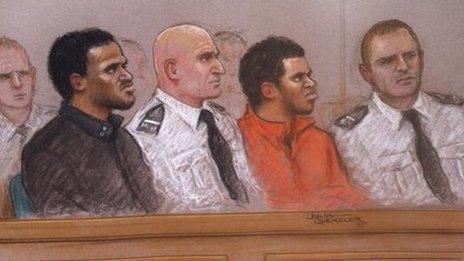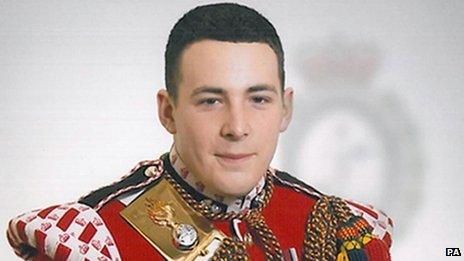Lee Rigby trial: Adebowale and Adebolajo 'wanted martyrdom'
- Published

Michael Adebolajo and Michael Adebowale are on trial at the Old Bailey
The two men accused of the murder of Lee Rigby wanted armed officers to shoot them dead so they could "achieve martyrdom", the Old Bailey has heard.
They took an unloaded gun with them to ensure armed police arrived at the scene in Woolwich, Michael Adebowale's defending counsel Abbas Lakha QC said.
Mr Adebowale, 22, who chose not to give evidence, and Michael Adebolajo, 29, deny murdering the soldier on 22 May.
They also deny attempting to murder a police officer.
Judge Mr Justice Sweeney told the jurors he expected them to retire to consider their verdicts on Thursday morning.
'No evidence'
In his closing speech, Mr Lakha said: "We submit that you will conclude that there is no evidence that there was ever any plan to kill a police officer."
He said the only reason the men had brought a gun - a 90-year-old weapon that had not been oiled, was not in working condition and was not loaded - was to ensure that armed police arrived.
And he said it was his client's intention for the officers who attended the scene to "fear for their lives".
Both men wanted the armed officers to kill them, he said.
"That is what both defendants intended - that they would be shot and therefore would achieve martyrdom," said Mr Lakha.
He later added: "His [Mr Adebowale's] actions from beginning to end speak for themselves - it was martyrdom he was after."
'Acted together'
The two men are accused of running Fusilier Rigby over in a car and hacking him to death close to Woolwich Barracks.
Mr Lakha said both men killed him "as soldiers of Islam - this was a military operation they planned together and their target in that operation was a British soldier, and only a British soldier, no-one else".
Referring to both men with their adopted Islamic names, Adebolajo as Mujahid Abu Hamza and Adebowale as Ismail Ibn Abdullah, Mr Lakha went on: "On behalf of the second defendant [Adebowale], I did not challenge Mr Abu Hamza's evidence.
"What that means is Ismail agrees with what Mr Abu Hamza said about the reasons for the killing of Lee Rigby and they were acting together in that way and for those reasons. That is his case."

The two men are on trial for the murder of Fusilier Lee Rigby in Woolwich
Mr Lakha added: "The fact he has not given evidence doesn't mean he says nothing in this trial.
"He uttered the two most important words any man in any court in this land can utter - he said the words 'not guilty'."
Summing up the case, Mr Justice Sweeney warned the jury not to let media reporting, speculation or "emotion" affect their verdicts.
"What's required of you is a cool, calm, careful and dispassionate consideration of the evidence," he said.
Queen's peace
He said jurors must consider three key questions in relation to the murder charge.
The first was whether Fusilier Rigby was under the "Queen's peace" when he was attacked - effectively whether he was killed in the course of war.
The other questions were whether he was unlawfully killed and whether the defendants were in a joint enterprise to kill or seriously injure him.
He told the jury there was no psychiatric evidence that either defendant was incapable of forming an intent.
"Just like a drunken intent, an intent driven by religious belief is still an intent," he added.
- Published17 December 2013
- Published13 December 2013
- Published9 December 2013
- Published5 December 2013
- Published4 December 2013
- Published3 December 2013
- Published2 December 2013
- Published29 November 2013